Exiled Iranian Prince Calls For Action To Topple Regime Amid Iran-Israel Tensions
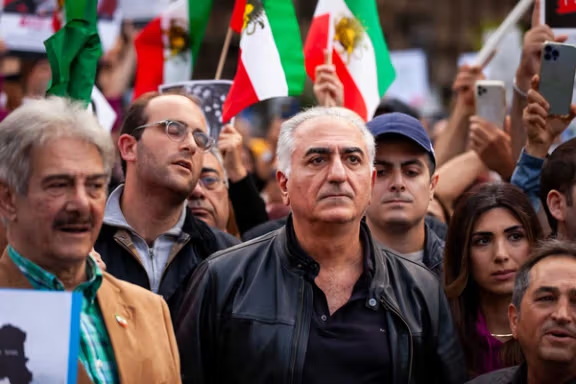
In a public statement on X, Iran's exile prince Reza Pahlavi urged collective action to topple the Islamic Republic amidst escalating tensions between Iran and Israel.

In a public statement on X, Iran's exile prince Reza Pahlavi urged collective action to topple the Islamic Republic amidst escalating tensions between Iran and Israel.
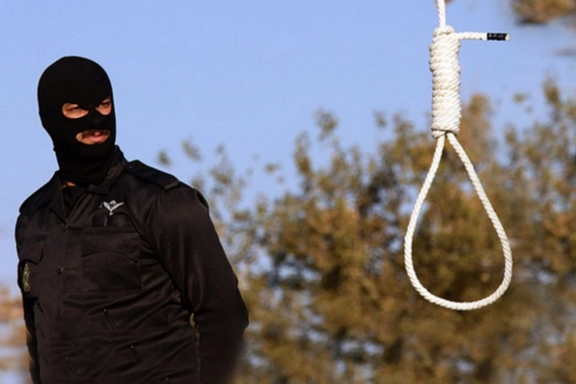
Recent reports from human rights organizations indicate a rise in the number of executions carried out in Iran.
At least four people were executed in Hamedan, Esfahan (Isfahan), and Zanjan province prisons from April 11 through April 14, an apparent spike in state-sanctioned killings.
On Sunday and Monday, five prisoners were locked up in solitary confinement in Ghezel Hesar prison of Karaj, near Tehran, and one in Rasht prison in preparation for their executions.
The new wave of prison executions in Iran, which the Islamic Republic has initiated, seems to run concurrently with its missile and drone attacks on Israel, amid the global focus on its military actions. Also, some believe that after a brief lull during the month of Ramadan, the government has resumed the high rate of executions witnesses in the past few months.
Amnesty International issued a report on April 4 where it explained that there is a rise in executions in Iran. The report explained that 853 people were executed in 2023, the highest record in eight years, with over half being hanged for drug-related charges, reflecting an 89% increase from 2022.
More than 80 human rights groups last week issued a joint statement urging the United Nations to press Iran to end its prolific use of the death penalty, mostly in matters of drug offenses. The groups have urged the UN Office on Drugs and Crime to review its collaboration with Tehran and suggest that any continued collaboration should be pegged on Iran stopping the executions.
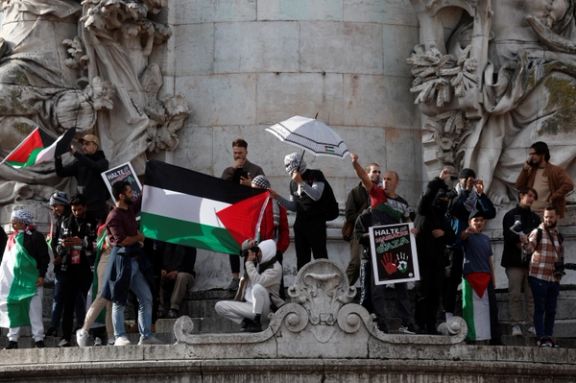
A highly confidential leaked document reveals the Iranian Revolutionary Guard (IRGC)’s role in directing an international campaign aimed at disrupting the world economy in protest against Israel.
Earlier today, Iranian opposition figure and activist Vahid Beheshti released a confidential letter signed by Brigadier General Majid Kazemi, head of IRGC’s Intelligence Security Organization. Kazemi was responsible for overseeing the IRGC’s operations, suppressing civil society in Iran, wrongfully arresting Iranian dissidents, including dual nationals, and overseeing the regime's brutal crackdown against protests across the country in response to the killing of Mahsa Amini in 2022, according US Treasury Department’s OFAC.
The letter from Kazemi, which is dated March 11, 2024 and titled “support and encouragement of Palestinian actions towards the political isolation of the Zionist regime," is addressed to Colonel Mohammad Sajedifar, the deputy of cultural and psychological operations of the IRGC Ground Force, and it states:
“Given the recent developments in the issue of Palestine and the psychological impact of the Al-Aqsa Storm operation on Palestinian communities in European and American countries, it was determined to implement significant support measures for April 15 and other rallies with the aim to achieve political isolation [of Israel].”
Alongside the letter, Beheshti shared the promotional video relating to the April `5 rallies, which Kazemi refers to in his letter adding:
“This video clip is the announcement of a collective movement aimed at disrupting the public order in Europe, USA, Australia and Asia all under the pretext of supporting Palestinians. This is a political movement intended to cause as much chaos and instability as possible, which are the exact goals of the Islamic Republic of Iran. The regime of the Islamic Republic has on multiple occasions, stated clearly that their goal is to destroy the modern society and build a global Islamic state.”
The video calls on the public to "block logistical hubs to stop the flow of capital worldwide”, to join the rally nicknamed A15, “a global economic blockade, answering the call from Gaza to fight for a liberated Palestine” on 15 April.
Beheshti further states that the rallies in Western countries are organized “directly in line with the mission of the Islamic Republic” and ordered by the IRGC.
In an interview with Iran International earlier Monday, Beheshti emphasized that the IRGC uses brainwashing tactics targeting youth in Western countries to cause chaos with such rallies being an example of these tactics.
Less than a month after the October 7 attack on Israel by Hamas, Iran’s ruler Ali Khamenei called for the blockade of oil and food exports to Israel and urged Muslim states to “not cooperate economically with the Zionist regime.”
Following Khamenei’s call, Yemen’s Houthis, a proxy of the IRGC, began targeting commercial vessels in the Red Sea with drones and missiles. The attacks have harmed international shipping and forces the US and UK to launch air attacks on Houthi bases.
The April 15 march organizers remain mostly anonymous. However, the video is heavily promoted by far-left groups, including Antifa, on social media. Uploaded to YouTube four days ago by A15 Economic Blockade, it directs viewers to their website, featuring a solidarity agreement among members to resist media, political, police, and “Zionist pressures”. The site emphasizes avoiding police communication or coordination regarding actions or fellow organizers.
Meanwhile, last year, the British police announced that the Islamic Republic regime is exploiting pro-Palestinian protests in Britain, according to the Times.
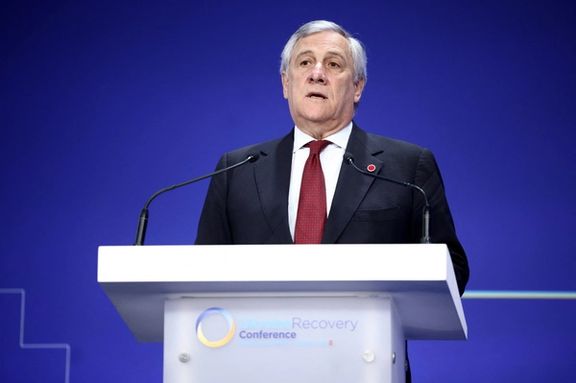
Italy, which holds the rotating presidency of the Group of Seven (G7), is open to new sanctions on individuals engaged against Israel following the Iranian drone and missile attack, its foreign minister said on Monday.
Italian Foreign Minister Antonio Tajani said fresh sanctions would need the backing of all the G7, which includes Italy, France, Germany, Canada, Japan, Britain and the United States. He also suggested that any new measures would be focused on individuals rather than whole nations.
"If we need to have more sanctions for people clearly engaged against Israel, supporting for example terrorism, supporting Hamas, it is possible to do it. But we need to be very serious and to work all together," Tajani told Reuters.
Tajani called the Iranian attack a "big mistake" for Tehran but "positive" for Israel as it had revealed the efficiency of its air defenses that shot down most of the drones and missiles with help from the US, Britain, France and Jordan.
The G7 on Sunday condemned the attack and urged Tehran to exercise restraint, with the United States warning Israel that it would not take part in a counteroffensive.
Tajani had a phone call with his Iranian counterpart before the attack to urge caution.
"For us it is important to protect Italian soldiers" working in the area under the auspices of the United Nations, he said, adding that Iran-backed Houthis in Yemen had to stop attacks on ships in the Red Sea, which is vital to world trade.
Ahead of a meeting of the G7 foreign ministers on April 17-19 on the Italian island of Capri, Tajani said, "All together we want to protect Israel, but we want to achieve stability and peace," he said.
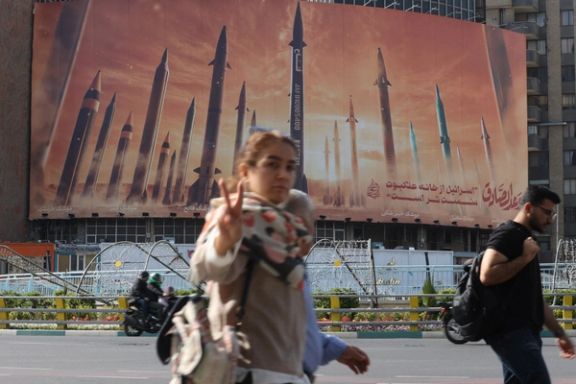
Iranian women are facing tougher crackdowns for refusing to wear the compulsory hijab in the shadows of Iran’s conflict with Israel.
While news of IRGC missile and drone operations against Israel over the weekend has overshadowed other events, on Saturday, as part of what they claim is a "national and public demand," the Iranian police have begun enforcing hijab regulations on women in a new initiative called the Noor plan, Persian for ‘light’.
Morality police are also back on the streets in full force, having been scaled back since the death of Mahsa Amini in 2022, with a stronger presence around Tehran’s central districts, full of police patrols, morality vans and police motorcycle patrols.
The 22-year-old Kurdish Iranian died in morality police custody suffering severe head wounds, sparking the strongest uprising against the regime since the founding of the Islamic Republic.
Businesses that do not comply with the regulations may find themselves closed down. Announced by Tehran’s police chief, Abbas Ali Mohammadian, it signals more oppression ahead for Iran’s women and girls.
"From today the police in Tehran, as in other provinces, will implement their measures against this sort of violation of the law regarding hijab," he said on live television on Saturday.
"People who did not pay attention to previous police warnings will be specially warned in the city from today and legal action will be taken against them," he added, just days after supreme leader Ayatollah Ali Khamenei said that women in the Islamic republic must obey the dress code, regardless of their beliefs.
A social media user wrote on X: "As a woman in Iran, the possibility of being killed by morality police is much higher than being killed by the attack of the Israeli army.”
Iran Human Rights reported the increased presence “at major crossings in Tehran”, noting that it is “their most significant show of force since the “Woman, Life, Freedom” uprising.
Video clips posted on social media also show citizens reporting that their car windows were broken by officers' batons, and others saying that they were assaulted by government motorcyclists as crackdowns worsen under the cover of Iran’s escalating shadow war with Israel.
Reports also suggest vehicles being seized and their owners punished for transporting women without veils. Authorities continue to shut down cafes and restaurants where the hijab rules were not enforced.
The escalating crackdowns on women come alongside Iran’s first direct attack on Israel from Iranian soil.
Over 350 projectiles were launched on Saturday night following the alleged April 1 Israeli air strike on the Iranian consulate in Damascus in which two senior IRGC commanders were killed along with several others.
It all comes while Iran’s controversial hijab bill, officially titled "Protection of Family Through Promotion of Hijab and Chastity Culture”, is awaiting approval, but officials have all but begun enacting its draconian regulations. Women now face even greater threat of arrest and punishments including travel bans for hijab defiance.
After initially securing parliamentary approval in September 2023, the draft was rejected for review by the Guardian Council, which is the ultimate legislative authority.
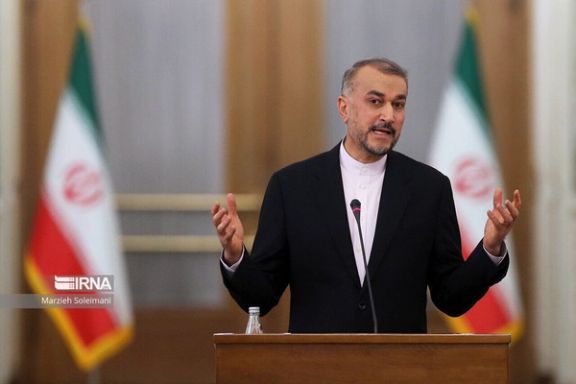
Iran's foreign minister warned on Monday of a harsh response if Israel decides to retaliate to Saturday night's onslaught of over 350 projectiles, telling his German counterpart that "the response will be immediate and all-encompassing".
Hossein Amir-Abdollahian spoke to Annalena Baerbock by phone on Monday and said, "The Islamic Republic aims to warn Israel of the consequences of crossing red lines".
His comments came after over 350 Iranian missiles and drones were launched towards Israel in the early hours of Sunday, 99 percent of which were intercepted by Israel and its allies, the US, UK, France and Jordan. It came after its consular facility was shelled in Syria earlier this month, killing seven Revolutionary Guards, including two senior officers.
Amidst the fears of a wider conflict, Abbas Golrook, a member of the National Security Commission of the Parliament, said, "I doubt that Israel will strike our civilian sites, not even our military ones." He noted, "Neither Iran, the region, nor the Americans have an inclination towards a widespread war," aware of the global repercussions. Amidst an economic crisis, a war for Iran would also be devastating, the country witnessing the worst recession since the establishment of the Islamic Republic in 1979.
Ahmad Alamolhoda, a firebrand cleric and Khamenei's representative in Khorasan Razavi province, echoed a long-standing threat issued by Iran's supreme leader. "Obviously, if any foolishness comes from Israel, Khamenei's promise to flatten Tel Aviv and Haifa will be realized," Alamolhoda declared. His statement referenced a 2013 warning from Khamenei, where he cautioned that any minor mistake by Israel could lead to devastating retaliation from Iran.
Follow developments on Iran International's Live coverage of ongoing tensions between Iran and Israel.
In his statement, Pahlavi firmly delineated the separation between the regime's ambitions and the desires of the Iranian people, emphasizing solidarity with the people who suffer the repercussions of the “oppressive” policies of the Islamic Republic apparatus.
"The war of Khamenei and his Guards with Israel is not the Iranian nation’s war. But it is you, burdened by economic problems and psychological pressures of a regime that has used Iranians as human shields for the past 45 years, that will bear the cost….”
Pahlavi further added that the fates of Iranians and Israelis have become intricately linked, with both nations yearning for peace obstructed by a mutual adversary: the Islamic Republic.
He highlighted that "the attack against Israel coincided with a new round of attacks on Iranian women," pointing to the new initiative by the police in Iran to enforce mandatory hijab regulations and crackdown on women intensifying.
Addressing the military in his statement, he implored them to rethink their allegiance and stand in solidarity with the Iranian people.
He further called on the Iranian diaspora to "urge the governments in the nations in which we live to cease appeasing Khamenei's regime and instead support the people of Iran.".
Central to Pahlavi's narrative is the imperative need for regime change, advocating for “the establishment of a national, secular, and democratic government", echoing the voices of the Iranian people and the ever-growing momentum behind the anti-government movement inside Iran.






